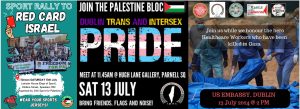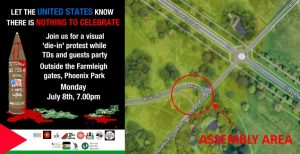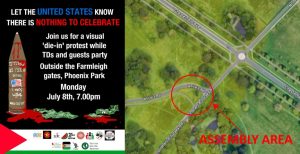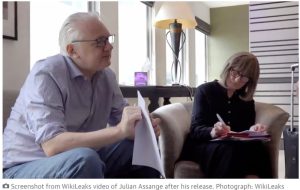From GALWAY ALLIANCE AGAINST WAR
The continuing scandal in Shannon airport and the carnage in Iraq have meant that GAAW has tended to concentrate on this aspect of Irish government collusion in foreign wars. However, the Lisbon Treaty referendum has brought into sharper focus how militarised the EU is becoming and how willing our political masters are to be involved.
From GALWAY ALLIANCE AGAINST WAR
The continuing scandal in Shannon airport and the carnage in Iraq have meant that GAAW has tended to concentrate on this aspect of Irish government collusion in foreign wars. However, the Lisbon Treaty referendum has brought into sharper focus how militarised the EU is becoming and how willing our political masters are to be involved.
During the Irish Presidency of the EU in June 2004 the European Council approved a statement that dealt with, amongst other military matters, permanent arrangements between the EU and NATO. Such arrangements will “enhance the operational capability of the EU and provide the framework for the strategic partnership between the EU and NATO”. Plus the operational doctrines of the EU’s military forces will be “in coherence with NATO”.
As Carol Fox in PANA’s excellent pamphlet “Irish Independence or European Superstate” notes, the Taoiseach presided over an EU Council that means “Ireland is now in a “strategic partnership” with NATO and agrees that the operational doctrines of the Irish armed forces, as channelled through the EU, should be “in coherence with NATO”.” Ahern also signed up for the promotion of a “commonality of security culture”. In other words he agreed to a military pact with nuclear powers that assert the right to the first use of nuclear weapons.
Of course, relations between NATO and the EU were already well established. The “Berlin-Plus” agreement on St Patrick’s Day 2003, which gave approval of the EU’s use of NATO’s assets and planning capabilities, is just one example. But Javier Solana is the very personification of the virtual unity of the EU and NATO. Since 1999 Solana has been the EU’s High Representative for the Common Foreign and Security Policy, but his previous post from 1995 to 1999 was Secretary General of NATO!
However, it was at the June 2004 EU Council meeting – presided over by Bertie – that the new 2010 Headline Goals in the military sphere were approved. This included agreeing to Javier Solana’s “security” document that foresaw “the support for third countries in combating terrorism” – something that is outlined in the Lisbon Treaty – and to the formation of EU Battlegroups to be deployable by 2007.
Irish participation in the Nordic Battlegroups was slipped through the Dail at midnight on July 4th 2006 after only a few hours of debate. Twelve TDs voted against – the Greens, Sinn Fein, 3 Independents and Joe Higgins. The Labour Party abstained! Referring to these Battlegroups, that hardly raised an eyebrow in Irish media circles, BBC correspondent Paul Reynolds stated: “The EU has quietly acquired what might be described as a standing army.”
And now part of that “standing army” – including an Irish Battlegroup, but with a much greater French contingent – finds itself in the former French colony of Chad. We are all aware of the dangers that lie there, especially as France has over the past couple of years been supporting the President of Chad, a dictator, in his battles with rebels ( or will they soon be described as “terrorists”). The Irish troops are there to protect refugees, but the fear is they will be sucked into the bigger conflict between the rebels and the regime in Chad.
What the human cost of our participation in this “standing army” remains unknown. But one thing is sure, the financial cost will be prohibitive. The Irish Defence Budget for 2008 is a whopping €1.078 billion. It is estimated €60 million of this will be used to fund our adventure in Chad. And if the authors of the Lisbon Treaty have their way Irish “defence” spending is certain to increase. Article 28(3) of the Lisbon Treaty states: “Member States shall undertake progressively to improve their military capabilities”. More money for warfare means less for health care.
As can be seen, much of the growing militarisation of the EU has been taking place without the Irish government having to seek approval per referendum. Another example of this was the establishment of the European Armaments Agency, which now has the more deceptive title of European Defence Agency (EDA). This agency is the brainchild of Solana and was accepted by the Irish government as one of the EU’s 2010 Headline Goals.
The purpose of the EDA is to promote the arms industry. Logically, an EU standing army needs armaments and as set out in the Lisbon Treaty (Article 28(3)) that is what it is expected to do. The EU States had already approved of the agency in 2003 and it appeared in the EU Constitution that was to be rejected by the Dutch and French in 2005. However, before the member states had formally approved the Constitution in 2004, the EDA was already in business with Solana at its head. According to the PANA pamphlet the EDA was massively influenced by the military-industrial-complex. (See Ben Hayes 2006 study for Statewatch – “Arming Big Brother”. It can be downloaded from the PANA website: http://www.pana.ie/download/bigbrother.pdf)
The Irish Government was not concerned about the controversial nature of this agency as it joined the EDA in July 2004. Indeed, it was later to come to light via a Dail question by Green Party TD (now Minister) Eamon Ryan that Enterprise Ireland was involved with the EDA in identifying Irish companies, which might participate in research programmes for the arms industry. So we have an Irish government that is encouraging Irish industry to get involved in the arms industry (just like it has opened Shannon airport to the US war machine). The Lisbon Treaty aims to formalise the EDA within the structures of the EU. For this reason alone any progressive person should be calling for a NO vote.
But perhaps the last word in this cursory glance at the militarisation of the EU should be left to Javier Solana. Last November at the conclusion of the meeting of the EU defence ministers – at which the EDA’s annual budget was increased by a third – Solana expressed strong support for increased investment in armaments, he stated it was an “absolute requirement for us to spend more, spend better, and spend together.”






